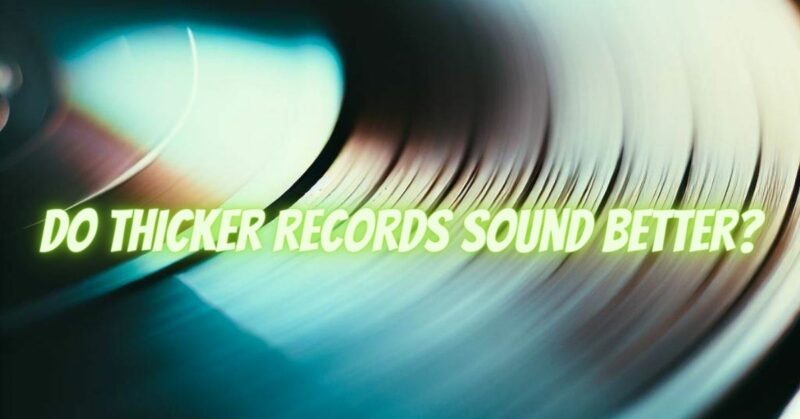Whether or not thicker records sound better is a complex question with no easy answer. There are many factors that contribute to the sound quality of a record, including the quality of the vinyl itself, the mastering process, and the playback system.
Vinyl quality
The quality of the vinyl itself plays a significant role in the overall sound quality of a record. High-quality vinyl will produce a cleaner and more detailed sound than low-quality vinyl.
Thicker records are typically made from higher quality vinyl than thinner records. This is because thicker records are more resistant to warping and vibration. Warping and vibration can cause distortion and noise, which can degrade the sound quality of a record.
Mastering process
The mastering process is the process of preparing a recording for release. The mastering engineer will adjust the levels, equalization, and other aspects of the recording to optimize the sound quality.
A good mastering engineer can make a significant improvement in the sound quality of a record. They can use their skills and experience to bring out the best in the recording and to make it sound its best on a variety of playback systems.
Playback system
The playback system also plays a role in the sound quality of a record. A good turntable and cartridge will produce a cleaner and more detailed sound than a cheap turntable and cartridge.
A good turntable will have a stable platform and a low-noise motor. A good cartridge will have a high-quality stylus and a well-designed body.
Thicker records vs. thinner records
In general, thicker records are more likely to sound better than thinner records. This is because thicker records are made from higher quality vinyl and they are more resistant to warping and vibration.
However, it is important to note that there are other factors that can also affect the sound quality of a record, such as the mastering process and the playback system. Even if a record is thick, it will not sound good if it has been poorly mastered or if it is played on a cheap turntable.
Tips for getting the best sound quality from your records
Here are some additional tips for getting the best sound quality from your records:
- Clean your records regularly. Dirty records can produce pops and clicks, and they can also damage your stylus. Use a record brush and cleaning solution to clean your records before playing them.
- Upgrade your stylus regularly. The stylus is the part of the cartridge that comes into contact with the record. It wears down over time, so it is important to upgrade it regularly to ensure optimal sound quality.
- Upgrade your turntable and cartridge. If you have a cheap turntable and cartridge, upgrading to a better turntable and cartridge will make a significant difference in the sound quality of your records.
- Set up your turntable properly. This includes setting the correct tracking force and anti-skate. If you are not comfortable setting up your turntable yourself, take it to a qualified technician.
By following these tips, you can get the best sound quality from your records, regardless of whether they are thick or thin.
Ultimately, the best way to decide whether or not thicker records sound better is to listen to them for yourself. There are many different records available at different thicknesses, so you should be able to find some that you can compare.
It is also important to keep in mind that the sound quality of a record is not just determined by the thickness of the vinyl. The mastering process and the playback system also play a significant role.
If you are serious about getting the best sound quality from your records, then it is important to invest in a good turntable, cartridge, and stylus. You should also learn how to set up your turntable properly.


